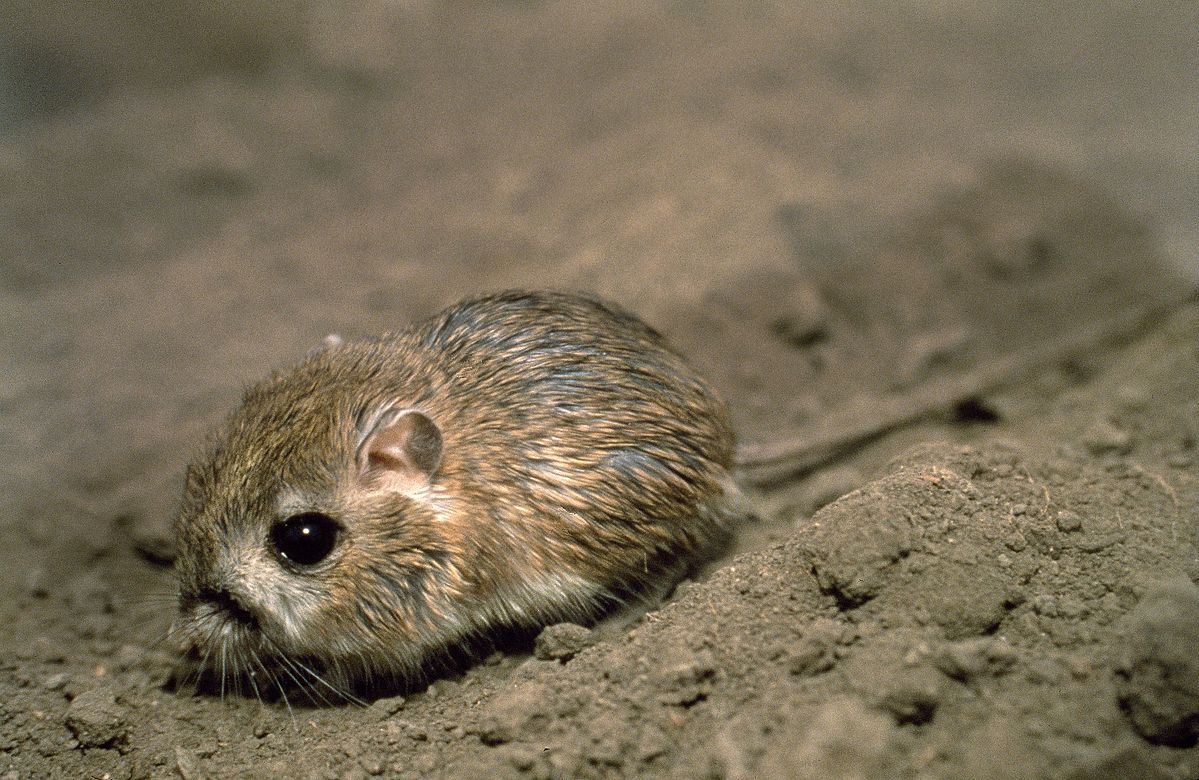|
I sat down with Caleb at the National Resources Conservation Service (NRCS) to talk about the services available for ranchers and farmers in Kern County. Caleb is the LGBT Special Emphasis Program Manager for California. He is passionate about creating a welcoming and supportive environment for LGBT members of the agricultural community. The NRCS provides land managers, ranchers and farmers with services to help them take advantage of financial support with conservation plans for their land. These plans can help them reach their goals for their land while protecting our Central Valley endangered species and maximizing the efficient use of natural resources.
We chat about his goals for his program, tipton kangaroo rats and competing in goat dressing at the gay rodeo. At the end of the interview, you’ll find resources on NRCS services and contact information. What work do you do at the National Resources Conservation Service? The Natural Resource Conservation Service's role is to provide customer technical assistance and financial programmatic-based assistance to any sort of land manager, farmer, rancher and other environmentally interested partners. We incentivize a handful of different practices, to say the least; there's hundreds and hundreds of different practices that we can support, and many are offered through our highly popular Environmental Quality Incentives Program. The whole goal of that particular program is to incentivize a better quality environment for everyone. The best way we can do this in partnership with farmers and ranchers is finding ways to improve their systems and make them less resource consumptive, more productive and more sustainable. Oftentimes we're able to find a crossroads where the farmer, rancher or manager can financially benefit from addressing a certain resource concern. Water is really expensive for instance, so if we can incentivize land managers to pay for a big overhead cost to install a more efficient irrigation system, they're getting the benefit of off-set installation expenses and the system is going to pay for itself in time with the accumulated irrigation water savings. How does a farmer or rancher get started with your services? Our process starts with visiting their site - generally they have an idea of what they would like to do, what their pipedream plans are for that site. We gather that information, determine if there is any association between the improvements they would like to make and the conservation of resources within their system. If those associations exist, it makes it pretty easy for them to enroll in our programs. What about the “conservation” part of the NRCS - do we have any endangered species or conservation areas in Kern County? Our Central Valley is really, really abundant - well, I guess not so abundant with endangered species, or they wouldn't be endangered, right? [laughs] We have a handful of listed species here in the Valley that we specifically do conservation planning to enhance their habitat. Oftentimes we modify our structural practices, like water delivery systems that are designed to improve the occupational capacity of the farm or ranch. To protect active threatened and endangered species habitat, we modify those practices to adapt to the habitat requirements of the species. For instance, the blunt nosed leopard lizard is one here in the Central Valley. We also have the Western pond turtle and yellow spotted salamander up in the foothills, and the tipton kangaroo rat - cute little creatures.
If we see a potential kangaroo rat burrow, the next thing we look for are tail drags - kangaroo rats will leave certain markings - and then we can identify their scat.
When we find threatened or endangered species, or we see indicators they might be in the area or the area is a suitable habitat for those species, we have to make certain accommodations, like installing a pipeline above ground or re-routing a pipeline that would require trenching through habitat. At the very least, we must survey the sites and assure that our actions are in compliance with federal, state, and local environmental law What does the NRCS focus on when it comes to resources? Wildlife is one of the big things we look out for. In a nutshell, the seven resource concerns that we look out for on the land are: soil, water, air, plants, animals and then these two other resource concerns - humans and energy. We have the acronym SWAPA for soil, water, air, plants and animals - that's our bread and butter. Humans and energy were added on later as we became more aware of their important role within the ag industry. Farmers can be caught between the market demands and the regulators. That's a consideration we need to be mindful of as an agency. That's partly why NRCS added on humans as a factor - we aren’t in the business of passing judgment on any farmer for the way they are farming. Nine times out of ten, the farmer or rancher wants to conserve resources, more than they already are. Most folks I work with have every intention of making their land continue to be productive in a sustainable way. Many want to hand off their farm as a business entity to future generations - the last thing they want is for that land to be degraded. But sometimes the demands imposed by competition within the agricultural industry allows them to overlook certain resource concerns that may be developing, and by the time it becomes an issue that they recognize, it's more costly to fix than it would have been to prevent. How do the Special Emphasis Programs work internally? Each Special Emphasis Program essentially has one leader for each state, covering that program. These are competitive positions where some of the most passionate and driven people in the state compete to take the lead in ensuring equal opportunity for a particular group. Here in California, we have a Black Special Emphasis Program, a Women’s Special Emphasis Program, a Hispanic/Latino Special Emphasis Program, a Disabilities Special Emphasis Program, American Indian/Alaskan Native Special Emphasis Program, a Veteran’s Special Emphasis Program, an Asian American/Pacific Islander/Native Hawaiian Special Emphasis Program, and an LGBT Special Emphasis Program. I feel like the competitive process brings a lot of passion to the table. At the end of the day you're sitting in a room with people who you realize think the same way as you do and they feel the same way as you do about this and that. They may have been inspired by the same things that you were, to get more involved in civil rights and equality. Maybe they saw a problem and they want to be part of addressing it; maybe they're going through something in their personal life where they feel they need to open up and diversify their work experience. As a government employee who works in a heavy workload office, we never run out of work to do. When I signed up for this, I signed up knowing this would take up an additional 20% of my time. I was a little timid about it because it's like, "Man, is that going to stress me out on top of the rest of my work?" But ever since I've started it's brought me such an incredible balance to my work, because it gives me a window to engage in leadership, to be artistic, to educate others, and to feed that passion of sharing concepts of equality and inclusion-. It's been a really, really great experience for me to be involved with, and it's expanded my understanding of every single one of these emphasis groups. What’s your goal as a Special Emphasis Program Manager (SEPM)? Within the country lifestyle, I feel that the population of closeted LGBT folks might be higher in proportion than in more urban densely populated areas. Not to say that these areas aren't cultured, but it seems to be a different culture where maybe LGBT folks aren't as loud and out. And for my role in the Special Emphasis Program that I'm managing, I’m hoping to increase our program delivery and to directly notify the LGBTQ+ farmers and ranchers out there that we are here to support them. We are always trying to assure that all members of our community are aware of the services we offer and that we are a welcoming workplace that thrives with diversity. There's not a lot of organizations that blend those two things - the human experience of being an LGBT person and being a farmer/rancher. I haven’t found many LGBT Farmer/Rancher groups out there. Perhaps the country/western culture is just beginning to accept it, that there are LGBT people who live in the country, there are LGBT cowboys, that there are lesbian, gay, and trans farmers and ranchers. I'm sure there's a lot of LGBT individuals in our food production industry. We just want to be sure that the NRCS is facilitating a supportive and welcoming environment where LGBT farmers can thrive, organize, and build upon the de-stigmatization of sexuality and gender diversity in their communities. I have seen some documentaries specifically tackling those challenges - how LGBT farmers may rely on partnerships with neighbors who have viewpoints, religious or philosophically, that they’re hesitant to reveal their sexuality or gender identity around them, for that reason. It's been documented in some short films and articles I’ve come across. I come from a rural community where there weren't many out and proud LGBT people, and many didn't come out until they left that place. I don't want to give a negative stereotype to rural communities, but what I do want to do is to create and facilitate a space within rural communities where LGBT farmers and ranchers feel there's no reason they can't be open and proud. That's why I've been trying to find areas where I can specifically target the LGBTQ farming community and build upon existing support systems. There's an annual Latino Farm Conference that the NRCS sponsors. I would love to facilitate community organization that could ultimately result in something like an LGBT Farmers Conference -Some place where there’s an established platform for folks to strategize and partner on various topics. For instance: What is it that makes an LGBT farmer have a different farming experience than others? What barriers exist for LGBT farmers/ranchers? What culturally, is unique about how the business is run, how the marketing is handled? Is the LGBT farming experience being properly represented to policy makers responsible for ensuring equality within their policy? Why isn’t there more agricultural representation of the gay community? What are some of the events you attend as an SEPM? Last year was our first gay rodeo event in California, in Palm Springs. Another SEPM in Nevada connected me to the hosting organization. I spoke to them over the phone and they were excited we were coming, giving us a booth free of charge, and having us back again this year. They've been incredibly kind and welcoming at the International Gay Rodeo Association events. Gay rodeo is slightly different from ordinary rodeos. There are specialized events like goat dressing and steer decorating, that involve timed competitions of putting underwear onto a goat or wrangling a steer so your partner can tie a ribbon on its tail. Competitors spend some time rolling around in the dirt and getting tossed around by the steer, so it can get pretty exciting. They all put on a great show. One of my colleagues who helped me staff our booth for that event actually competed in the goat dressing with me last year. We got a really close second place. Next year, the gold! [Laughs] Yeah! We’ll see! So that's been one of the windows - gay rodeo - where we can find overlap between "who can benefit from our programs" and "individuals being out and proud members of the LGBT community.” The gay rodeo is perfect for that. Most of the responses we get from people is "USDA? What are you doing here? What does USDA care about gay rodeos?" For me it hurts to hear that people feel that way, but it gives me the justification and excitement to say "Well, I'm here and we do care!" In today's political climate, it's difficult to know what resources you do and don't have available to you. In pretty recent years we've heard a lot surrounding civil rights and there's been some instability in terms of people's thoughts and worries about what direction we're going in our country with civil rights. I've looked at our equality statement and mission statement every year for the last several years, and our statement has not changed. Our commitment to equality and equal opportunity has not changed. Our commitment to creating inclusive, accepting and empowering workplaces for everyone who works here has not changed. That has been a huge part of what has kept me growing in my career pathway despite the hard parts that come with any walk of life. I do have to say California is one of the best places to be a SEPM because we have some of the most diverse opportunities to engage in all realms of civil rights. When I finish my three year tenure with this role as SEPM, one of my suggestions will likely be to expand our Civil Rights Advisory Committee to allow for two individuals to fill the LGBT SEPM role in CA. I feel that our state offers so many opportunities to engage in LGBTQ+ outreach and recruitment activities, that it’s a job for more than one person. I also feel that the LGBTQ+ demography carries within it SO MUCH diversity, that there should be multiple perspectives when developing the special emphasis program goals and objectives. We are all limited to our own experiences and exposures when it comes to the perspectives that we bring to the table, and I have learned more than I ever anticipated in filling this role… I’m sure the learning experience will continue as well. If I am a gay farmer or rancher and I reach out to you, what can I expect the NRCS to do for me? We can come to visit your site and ask "What are you hoping to do with this land?," and hopefully help them to work towards those goals. If they need their soil to be checked out, we can dig some holes and explain about the physical soil quality indicators we can identify on site. We can even run some basic soil health tests in the field to measure other indicators like aggregate stability, infiltration rate, salinity levels, pH, Nitrogen concentrations, among other things. Our services are already paid for by everyone’s tax dollars, so we want to make sure that everyone who is paying taxes is getting a chunk of our services. it reassures me when I know that people are getting their tax benefit; whenever I’m able to facilitate a connection and somehow provide assistance. We often come across non-traditional customers with non-traditional requests, and those have turned out to be some of the most rewarding experiences I’ve had in my work. Whether you have been farming for decades or plan on starting next year, we are a public resource and always happy to share our expertise and knowledge. Once we develop conservation plans (based on their goals) with the land managers we work with, we ordinarily offer the opportunity to enroll in one or many of our conservation programs to help financially support the implementation of the conservation plan. My scientific expertise comes from my network. We have PhD's who research plant performance for a living on our staff. I can contact them for advice on drought adapted plants and irrigation limitations, and they are always interested in helping use the tools that science gives us. They’ll tell me, “These plants can handle this, and these plants can handle this and this.” They're doing real time research right here in California within NRCS. I always do my best to connect with every land manager who I have the opportunity to interact with, and help them understand all the resources they have available at our agency. It is always my goal to be able to invest in someone’s commitment towards a more conservation friendly system. Final Message from Caleb: The big thing that we would like to convey as an agency is that our services are available to all and we invite any farmer, rancher, land manager, naturalist, or other environmentally interested potential partners to visit us and find out how we can work together to meet common goals. To apply for any of our programs, or just to get an idea of whether their goals align with what our programs offer, a phone call or visit to the office within their service center is the best place to start. [RESOURCES FOR FARMERS AND RANCHERS] Map of USDA/NRCS Offices - Link Environmental Quality Incentive Program: PDF link. Read more about EQIP at their website. NRCS Chief’s Civil Rights Policy Statement - PDF Link Agency Links: Farm Service Agency - https://www.fsa.usda.gov/programs-and-services/index Rural Development - https://www.rd.usda.gov/programs-services National Resources Conservation Service - https://www.nrcs.usda.gov/wps/portal/nrcs/main/national/programs/ To get in touch with the new SEPM for the program, please reach out to Julie Meyers (she/her/hers) in the Concord Field Office – (925) 690-4154 - [email protected]
0 Comments
Your comment will be posted after it is approved.
Leave a Reply. |
The Center for Sexuality & Gender Diversity (The Center) is a Community-Based Organization and 501(c)(3) nonprofit organization serving the 2SLGBTQIA+ community in Kern County.
Receive Monthly UpdatesWe have so many exciting things going on, be the first to find out!
|
Helpful Links |
Get Involved |
Contact Us |
Certified as Financially Sound and TransparentEIN: 45-3709449
|
|
© The Center for Sexuality & Gender Diversity 2018
|



 RSS Feed
RSS Feed


